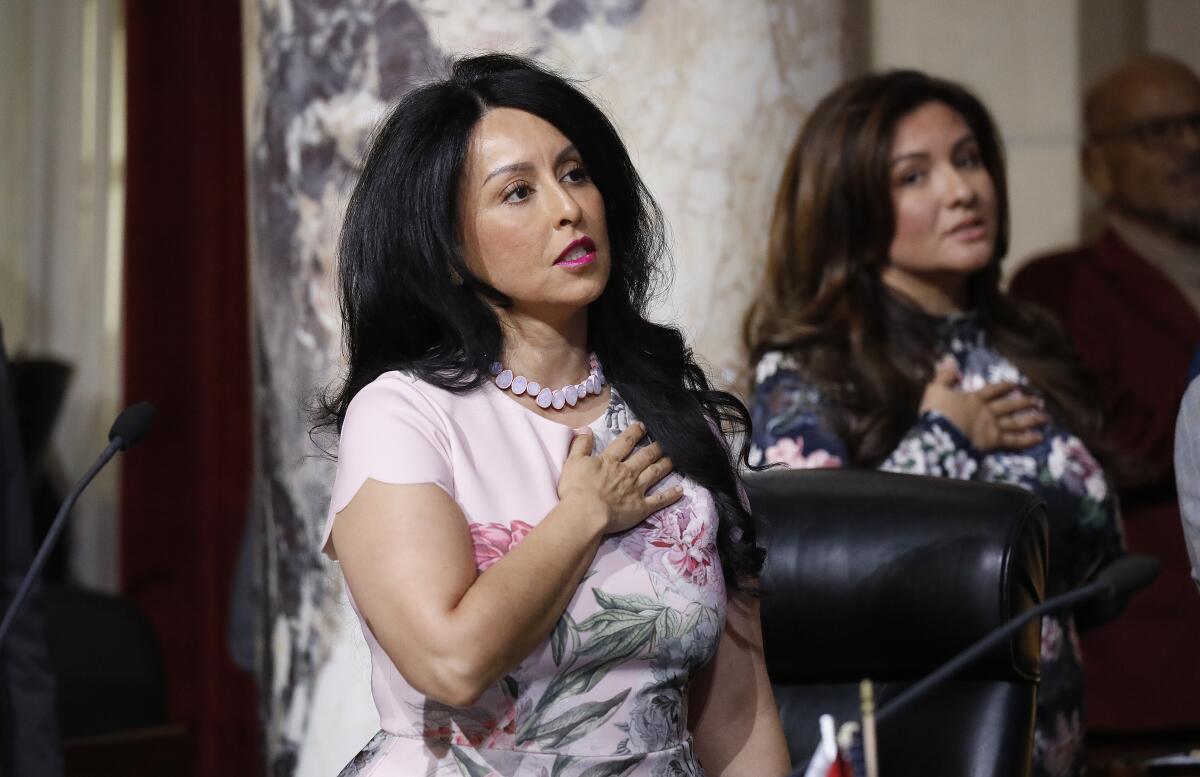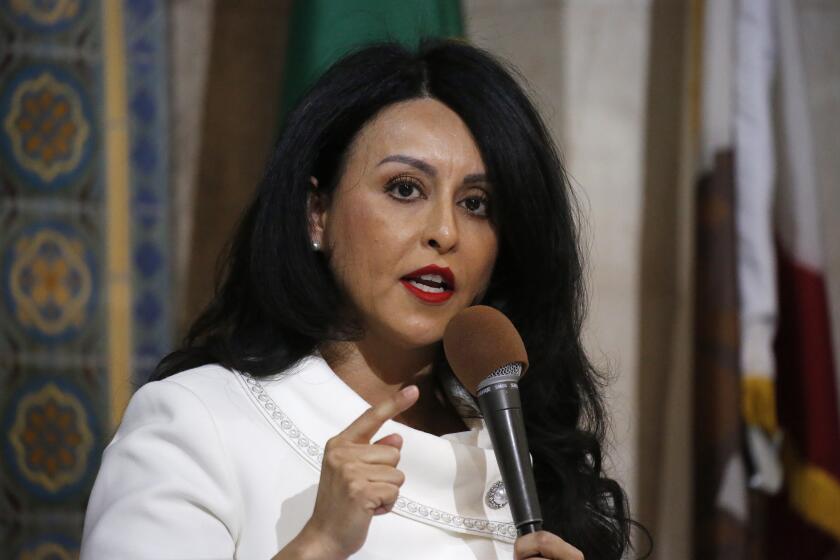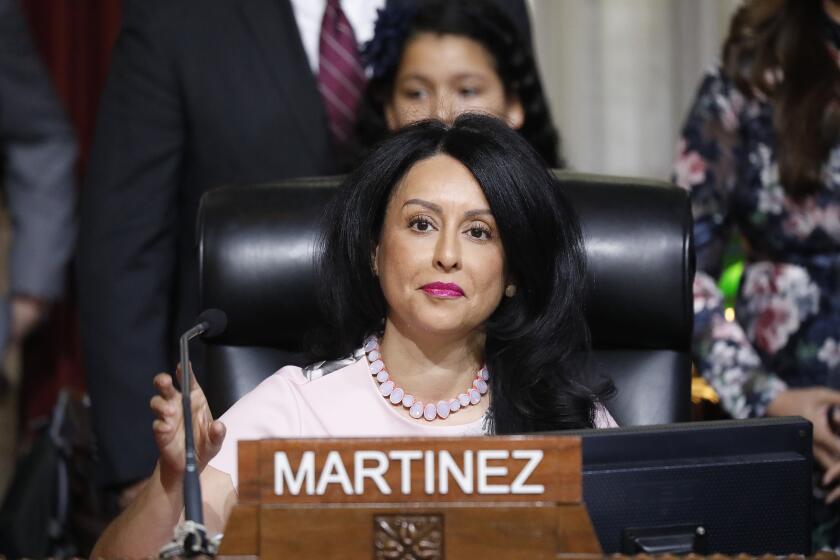If Nury Martinez loves L.A., what does hate look like?

- Share via
Out of all the things former City Council president Nury Martinez has said, or been heard to say, this last week, her initial plea for forgiveness from “the residents of this city that I love so much” is probably the most outrageous.
Which is saying something, given the scattershot racism, bigotry and personal vitriol she projectile-vomited in an October 2021 meeting with Councilmembers Gil Cedillo and Kevin de León and Los Angeles County Federation of Labor President Ron Herrera. Not to mention the unsettling message to “little Latino girls” in her resignation announcement on Wednesday, precipitated by a leaked recording of the meeting and the three days of chaos (so far) that followed. “I hope I have inspired you to dream beyond which you can see,” she continued.
I guess that tracks — if “beyond which you can see” includes a Latina City Council president who does not attack huge swaths of the city’s population.
Black Angelenos, Oaxacan Angelenos, Jewish Angelenos, Armenian Angelenos, as well as anyone of any race who supports them, were all disparaged by Martinez. As no one in the room seemed surprised by her racist remarks and cavalier contempt, it seems difficult to believe this was an isolated incident.
So Martinez’s initial apology included the reference to “the city that I love” raised more than a few questions.
“It is with a broken heart that I resign my seat for Council District 6,” Nury Martinez wrote in a statement.
For instance: How exactly do you love a city when you clearly hate so many people who actually live there? Is it the weather you’re referencing? Or the foliage? It certainly can’t be the food or the music, art, entertainment, fashion, literature or architecture, since so much of it is made by the groups you disparaged.
Is it the traffic?
I hope you’re not talking about the people you claim to represent, those “communities of color” you were attempting to “help” with such a reductive, hate-filled conversation about the very important subject of redistricting. Whatever aid you hoped to offer was lost in the self-destructive power plays and humiliating put downs, all reeking of “us versus them.”
There is always something to be said for revelation, even when it’s accidental. Hearing Martinez’s words is shocking — except, you know, it’s not. In the abstract, we all know that there is nothing she said that hasn’t been said, in one form or another, in political forums throughout history. Most of those conversations, having not been taped and leaked, can only be reconstructed through political and social outcomes — racist policies; bigoted interpretations of the law; top-down redistricting fixed to serve only those entrenched in power.
A leaked recording of L.A. City Council members and a labor official includes racist remarks. Council President Nury Martinez apologizes; Councilmember Kevin de León expresses regret.
As a Latina, Martinez has undoubtedly been on the receiving end of racism and sexism, whether aimed at her personally or at the two historically oppressed groups to which she belongs. As my colleague L.Z. Granderson recently pointed out, the meeting in which the outrageous remarks were made was all about power, about protecting heavily Latino districts from losing economic assets, including LAX, and political representation. Half of L.A.’s population is Latino, but they represent less than a third of the city’s 15 districts.
Which makes her comments — directed at people who have suffered the same sort of discrimination and underrepresentation — very much the opposite of love.
But then, politicians always claim to “love” this great country/state/city even as they enact policies that ignore or harm large portions of the population, including Latinas. Ordinary people express similar devotion to this nation while clearly despising large swaths of its people, denying its actual history and ignoring the best parts of its own mythology.
Things like: “Give me your tired, your poor, your huddled masses yearning to breathe free, the wretched refuse of your teeming shore.” You can’t love the Statue of Liberty and hate what she stands for.
Love is always a tricky word; when used in active first person, it is completely subjective and often at odds with the experience of the purportedly beloved in ways that can be baffling, frustrating and sometimes quite toxic. While we do not expect politicians to love a city or a country in the same way they love their families, it is not too much to expect them not to actively hate or openly degrade the people who live there.
Audio of Councilmembers Nury Martinez, Kevin de León and Gil Cedillo speaking with labor leader Ron Herrera quickly became a new and incendiary issue in the Nov. 8 election.
So the next time someone declares how much they love Los Angeles, or the United States, maybe we should start pressing them for details. What exactly do you love about it? Give us 10 concrete examples and, in the case of L.A., keep the weather out of it. What are 10 things you don’t love (again, no weather), and what do you think we should do about them?
Actually, maybe we should keep love out of it entirely. No one can be expected to love all of Los Angeles, at least not until they fix the 5 to the 110 interchange and either get rid of leaf blowers or figure out how to mute them. This is a string of urban islands posing as a city in which half the population still doesn’t know how to get to City Hall. It’s amazing and infuriating, horrifying and glorious.
But Angelenos know the difference between love and hate, so don’t try to claim one when you’ve shown so much of the other. This city may not need to be loved, but it does demand a little respect.
More to Read
The biggest entertainment stories
Get our big stories about Hollywood, film, television, music, arts, culture and more right in your inbox as soon as they publish.
You may occasionally receive promotional content from the Los Angeles Times.













